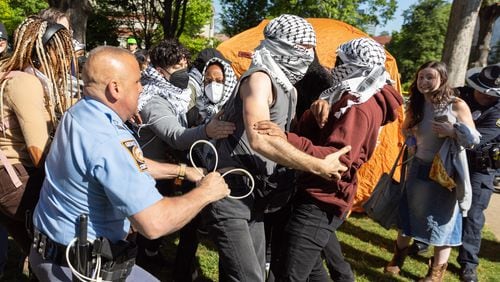ST. PAUL, MINN. — Garrison Keillor was riding shotgun in a rented Chevy, motoring east through the steamy Midwestern heat.
His linen suit was appropriately rumpled — everything about this public radio legend suggests disregard for crisp lines — and his gangly legs were jacked up against the glove box, as he resisted suggestions to slide his seat back. Hitching a ride with a reporter from Minneapolis to his home here, he filled the yawning silences with a weird little singsong, “bomp, bomp, bomp, bomp.”
He had just spent hours rehearsing for the following night, May 21, when he hosted “A Prairie Home Companion,” at the State Theater in Minneapolis, before a packed, adoring crowd for the last time.
After more than four decades of hosting this homespun Americana musical variety program, which he created and which, in turn, created him, Keillor is retiring. He has done this before, in 1987, though that retirement ended up being a sabbatical. In 2011, there were rumors — baseless, Keillor’s people said — that he was thinking of abandoning ship then, too.
But this time, Keillor, 73, said he means it. He has named a successor and lined up meaty post-"Prairie” projects, among them columns for The Washington Post, a screenplay and a book. While he has a solo tour planned through the year, along with a “Prairie"-esque Labor Day weekend show at the Minnesota State Fair, he will host his final official “Prairie Home Companion” on July 1 at, of all places, the Hollywood Bowl.
“It’s very much real, and it’s simply a matter of wanting to rearrange one’s life,” Keillor said after we had arrived at his large, handsome Georgian house, and he had eased his stooping 6-foot-4 frame into a porch chair. “In order to do these things, I’ve got to clear out the big buffalo in the room, which is the show.”
At his home, Keillor looms, a melancholy presence, and doesn’t make much eye contact, keeping his bespectacled eyes averted under scraggly eyebrows. Rather than savor the conversation, he seems to cordially endure it. His mellifluous voice, likened to a down comforter or “a slow drip of Midwestern molasses,” feels warmly familiar to any public radio listener who has heard him sing “Tishomingo Blues,” which opens his show each Saturday evening.
Yet as familiar and cherished as “Prairie” has become to millions, it was always about Keillor’s fascinations, rather than the inner tickings of its host.
“It was never about self expression, never,” Keillor said.
Everything about “Prairie Home” — the Guy Noir and Lives of the Cowboys sketches, the spots for Powdermilk Biscuits and the Ketchup Advisory Board, the monologues about the fictional Lake Wobegon — sprang from Keillor’s imagination. But the man spinning the plates at the center of it all managed to stay a mystery, even to people who know him well.
“Garrison in person is quite different,” said his longtime friend, the writer Mark Singer. “Garrison does not express emotion in interpersonal conversations the way the rest of us do.”
Performers often cultivate alternate personas, but with Keillor the difference is startling. That night, onstage in Minneapolis, he was garrulous and affable, and afterward ventured out onto the sidewalk to meet his hundreds-strong admirers, many of whom feel they know him intimately.
As fans flocked around him, Keillor graciously deflected questions, directing queries back to the scrum. This helps him gather story ideas but also serves as a bridge from his onstage personality to his default setting, the introverted, removed man who seems miles away, even when you’re sitting 2 feet from him on his porch, eating the jelly beans he has set out.
“His gaze is often floating and takes you in from a strange distance,” said the writer and editor Roger Angell, who in 1970 edited Keillor’s first piece for The New Yorker. “He is certainly the strangest person I know.”
There is debate about whether Keillor should have exited a while ago. His weekly radio audience peaked 10 years ago, at 4.1 million, and has since dropped to 3.2 million. While that does not include listeners on Sirius XM, or the show’s 3 million monthly digital requests, many stations have dropped their Sunday repeat broadcast of his show.
“Prairie Home” captured a time, before tweets and Facebook posts, when people talked more over fence posts and pots of coffee but nowadays feels increasingly removed from many listeners’ lives.
“A lot of the conversation has been: ‘Did Garrison wait too long? Should Garrison have done this years ago?'” said Eric Nuzum, former vice president for programming at NPR. “The problem of ‘Prairie Home Companion’ is it’s part of public radio’s past, not their future,” Nuzum said. (American Public Media distributes “Prairie Home”; NPR member stations air programs from APM as well as from other distributors.)
Still, Keillor played an outsize role in shaping what public radio has become.
He was a pioneering force and taught public radio valuable lessons, Nuzum said. The live performances and touring built audiences and kept them connected and deeply loyal. That proved lucrative, as did sales of “Prairie Home Companion” recordings, books, clothes and tchotchkes. Keillor also became one of public radio’s earliest celebrities, appearing on the cover of Time in 1985.
The show itself, with its singing, quirky sidekicks, stealthily dark humor and fart jokes, forged a new path.
“'Prairie Home Companion’ came on the scene just as public radio was trying to figure out what its identity was,” said Ira Glass, the host of “This American Life.” “The fact that here was such a visibly weird, funny, idiosyncratic show opened up the space of other weird, idiosyncratic shows, like ‘Car Talk,’ and our show.”
Adored as he has been by millions, Keillor drove a few critics around the bend.
Detractors view “Prairie Home” as excruciatingly hokey, syrupy and dull. In a 1993 episode of “The Simpsons,” Homer bangs on the television — the Disney Channel broadcast the show in the late ‘80s — hollering, “Be more funny!” In a withering review of Robert Altman’s 2006 film, “A Prairie Home Companion,” Rex Reed called Keillor “a myopic doughboy” and his program “a lumbering, affected and pointless audio curiosity.”
Yet Glass believes that many people mistake “Prairie Home” for quaint, homespun nostalgia, even though the tales from Lake Wobegon are, as often as not, richly emotional, contemporary and quite dark.
In recent monologues, Keillor has lambasted the gun lobby, told of people’s relatives being buried alive and mentioned a would-be suicidal woman left bald after she accidentally set her hair on fire in her gas oven, a presumably fictitious anecdote that is trademark Keillor: equal parts alarming, heartbreaking and funny.
“Like Howard Stern, Garrison Keillor created a packaging that nonlisteners took as real,” Glass said. “And the actual show is so much more complex, and human and complicated than nonlisteners think it is.”
Keillor has had health concerns, suffering a stroke in 2009, and, less than a week after the Minneapolis show, a seizure. But he insists it’s his other projects that compelled him to step away. After July, he will continue to have a small radio foothold, hosting “The Writer’s Almanac,” a stand-alone five-minute radio program
he started in the early ‘90s. And “Prairie Home” reruns will continue to air. Jon McTaggart, chief executive of American Public Media Group, the parent of American Public Media, said that as much as “Prairie Home” contributed financially, he has faith in the allure of the new version of the show and that “this transition has been planned for a while.”
Still, the future of “Prairie Home Companion,” and public radio, without Keillor remains somewhat of an open question.
Keillor’s hand-picked successor, folk musician Chris Thile, 35, who first performed on the show as a teenager, cheerfully admitted in an interview that it could all go down the drain if audiences reject him after he begins hosting on Oct. 15. Details are still being hammered out, but Thile plans to do musical numbers and comedy bits. There will be no Lake Wobegon.
“Public radio always wondered what it was going to do when Garrison leaves,” Nuzum said. “It’s about to find out.”
About the Author





